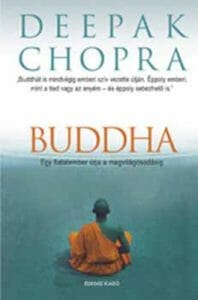This is a book review of Buddha. A book written by Deepak Chopra, it’s a fictional work of Siddhartha Gutama’s life, the Prince who became a Monk who found enlightenment. The review is my take on the highlights of the story only.
Siddhartha was born a Prince to King Suddhodana and Queen Maya. While the king was waging war, Maya birthed Siddhartha in the Lumbini Grove on 
the way to her King. She clung to a large Sal Tree and the royal guards and ladies assisted in both the birth and assuring her safety. The Priests at his ceremony predicted that the boy would not go on to rule the kingdom, but rule the world. It was forecast that he would bring about the next golden age that would put an end to suffering and bring about peace and prosperity in the land.
The Queen died a short time after his birth and the king declared that all elderly, poor and in suffering should be moved outside the city walls, to a place where Siddhartha could never witness their suffering. The King wanted to keep his Son safe and ignorant of the outside world, so he would never be tempted to leave.
Siddhartha made friends with the Stable Masters son, Channa, and their friendship grew. The king then found another prince in the region, Devadatta, a little older and a lot more ambitions, to come and live at the Place as companion to the Prince. Devadatta was envious of the Prince and jealousy drove him to turn bitter, violent and vengeful.
The demon, Mara, is all that is dark, mischievous and tormented. He invades Devadatta through his envy and uses his mind to create pure evil. Mara represents all of our negative thoughts. Asita was the good asecetic that came to Siddhartha in numerous visions and encompassed all that is compassionate, peaceful and loving. He represents all of our good thoughts.
Siddhartha’s young romantic interest was raped and murdered by Devadatta, he and Channa took horses out of the Kingdom gates, and there he saw the outcasts, the elderly and the sick. All in a state of despair after the king has them thrown out at Siddharthas birth. From that point, Siddhartha began to take them food, medicine and money to help and his compassion grew.
Siddhartha was forced to choose a wife, from a long procession of eligible women and girls. He asked each a question and the last in the line was the one who spoke with kindness, honesty and compassion, and theirs was a true love match. They had a son, and soon after Siddhartha participated in a great ceremony of warriors, where he would be pronounced air to the throne. In the ceremony, he accidentally killed a mounted archer with an arrow, and in that moment realised how each piece of his life was like threads of a fragile tapestry melding together, but at the same time those threads bound him to a life of suffering.
Soon after he left the palace to learn the ways of the Monks, he threw off his Princely robes and learned to live the life of a hermit. During this phase he met many teachers, spent years in meditation and came back only after being found near death by a young woman. He then began teaching all that he had learned as he awoke being enlightened. Soon after, remembering his wife and son, he realised being unattached was unrealistic and had the grace to laugh at his notion of enlightenment.
On his return, the kingdom was in a major battle, which he walked through and put to peace. He then went about creating the Buddhas Dharma which includes:
The Four Noble Truths:
- Life contains suffering
- Suffering has a cause and the cause can be known
- Suffering can be bought to an end
- The path to end suffering has eight parts
The Eightfold Path contains eight steps that asks you to pluck out what is wrong and ineffective in your mind and replace it with what is good, this is a lifelong process. It includes:
- Right perspective
- Right intention
- Right speech
- Right action
- Right livelihood
- Right effort
- Right mindfulness
- Right concentration
The three dharma seals speak to us about human realities:
- Dukkha – Life is unsatisfactory and any pleasure or pain is only transient.
- Anicca – Nothing is permeant. Everything can be swept away in an instant.
- Annata – The separate self is unreliable and unreal, our sense of self is an illusion.
This book was a very easy read and highlighted the beautiful story that was Buddha’s life journey. The fictional parts are wrapped tightly around truth to give the reader a great understanding of Siddhartha’s life and the birth of Buddhism as we know it. Definitely worth a read if your’e interested in the history of Buddhism.







